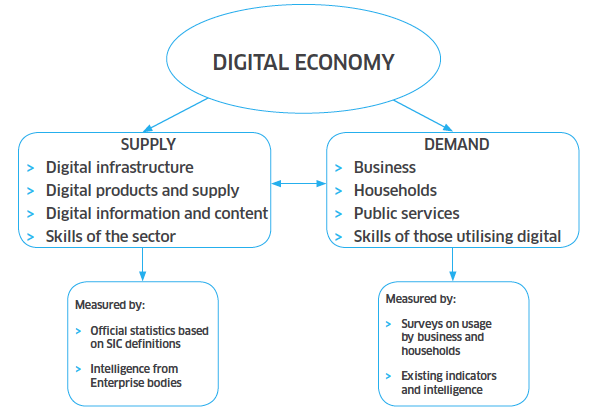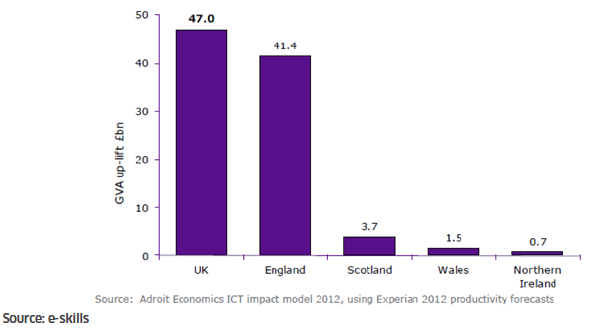Scotland's Digital Future: supporting the transition to a world-leading digital economy
Assesses the role that Scotland's public sector is playing in stimulating the digital economy and proposes actions that could be taken.
2 The Digital Economy
Introduction
Scotland's future is a digital future.
The disruptive power of digital and the convergence of more established technologies are transforming business models and operations, changing our expectations of service and creating new business opportunities at home and abroad.
We must ensure that all businesses have the confidence, capability and skills to take full advantage of the benefits the digital economy can bring.
Scotland faces this challenge from a position of considerable potential strength in areas such as big data, digital health and care, smart mobility, and sensor systems. Inward investment is attracted by the skills we can offer and the quality of the research taking place in our leading universities.
However, we recognise that the digital economy is a global economy and there is no room for complacency. New opportunities are emerging in areas such as Big Data and Machine to Machine Technology and a reliance on the successes of the past is not sufficient. There are still too many businesses in Scotland that have not yet embraced digital technology. We are still missing out on the full extent of the economic benefits that can flow to a truly digital nation. We need to do more to ensure that our computing and informatics skills continue to lead the world, that we continue to innovate and that digital businesses of all sizes are encouraged to develop in our country.
This document looks at what more we can do to ensure that we are fit for a digital future. It aims to stimulate a debate about the action that is required to sustain a world class digital economy. In so doing, it describes a new kind of partnership between the public, private and third sectors that is uniquely suited to the challenges of the digital age and, for the first time, it pulls together the work of our enterprise and skills agencies into a seamless programme of action to stimulate the digital economy.
What is the digital economy?
The term "digital" in this context is used to refer to those activities that involve internet or web-based technologies. This includes digital infrastructure (fibre, wireless etc.), digital platforms (websites, mobile etc.) and digital content (information, entertainment etc.).
The term 'digital economy' therefore comprises both the use of digital activities to conduct business and support growth across Scotland's economy as a whole (the demand side) and the extent of the business base that develops, delivers and supports such technologies at home and abroad (the supply side).
Figure 1: Scotland's Digital Economy

Why is it important?
Digital technologies are widely recognised as enablers of productivity and drivers of innovation and international trade. They underpin business growth across every sector of the economy and help to boost jobs and generate export income. A recent report by e-skills UK, the Sector Skills Council for Business and Information Technology, suggests that Scotland could increase its GVA by up to £3.7 billion [1] over the next 5-7 years if action is taken to stimulate the digital economy by increasing the range and quality of online services, promoting digital literacy and skills at home and at work and encouraging innovation and enterprise across different sectors.
Figure 2: GVA uplift at the national level over the next 5.7 years

Scottish businesses have the opportunity to benefit from:
Improved productivity - studies suggest that US multinationals are, on average, 8.5% more productive than domestically owned firms in the UK [2] and that over 80% of this productivity advantage is explained by their better use of IT [3] .
Increased turnover - it is estimated that total annual turnover of SMEs could be boosted by £18.8 billion p.a. across the UK if all firms sold and marketed their goods and services online [4] .
Reduced costs - with a 2011 survey for the European Commission suggesting that 80% of organisations could reduce costs by 10-20% by moving back office operations to the Cloud [5] .
Better customer service - with 54% of SMEs noting improved levels of customer interaction and service from increased used of the internet [6] .
Technology has also become a key enabler for internationalisation. Through online channels and applications such as e-commerce, digital marketing and social media, companies can access and trade in international markets more readily than ever before. With more than 90% of Scottish e-commerce already being conducted with other UK or overseas customers, this is a key opportunity for Scotland - and in particular for our globally competitive sectors such as food and drink, tourism, textiles and creative industries.
How are we doing?
There are a plethora of international rankings and benchmarking studies comparing progress of countries across a range of digital measures such as next generation broadband coverage, market concentration in broadband market, uptake and adoption of digital technologies and the skills of users to exploit digital services. Underpinning each study lies different methodologies, data sources and indicators making comparisons between different studies problematic.
Internationally comparable data from these studies is generally more readily available at the UK level with limited focus on the nations and regions within the UK. However, as illustrated below, these studies consistently rank the UK highly in terms of its progress in the digitisation process.
- The Booz & Company Digitization Index [7] (2012) ranks the U.K. 12th among 150 nations, based on the speed, reliability, and ubiquity of infrastructure; affordability of access; usability of services; and skills of the population.
- The World Economic Forum's Networked Readiness Index [8] (2012) ranks the U.K. 10th, on the basis of the impact of technology on international competitiveness.
- The Economist Intelligence Unit [9] (2010) ranks the UK 14th, based on a range of digital economy measures covering infrastructure, business, legal and cultural environment and consumer and business adoption.
- Boston Consulting Group's e-Intensity index [10] (2012) ranks the UK 5th, on the basis of the relative maturity of Internet economies on the basis of three factors: enablement, engagement, and expenditure.
Measurement
Figure 1 describes a measurement framework, adapted from OECD's measurement framework for the information society, that will enable us to:
- track Scotland's progress in the digital economy and in comparison to other countries (set out in the headline indicators described in Annex A);
- inform policy and the development of support programmes to accelerate the rate of adoption of digital infrastructure and technology and the exploitation of its full economic potential.
The use of this framework will provide a more accurate measure of the progress that Scotland is making towards sustaining a world-class digital economy.
Contact
There is a problem
Thanks for your feedback